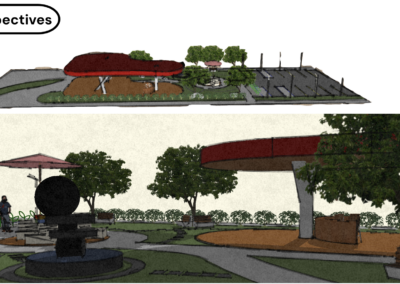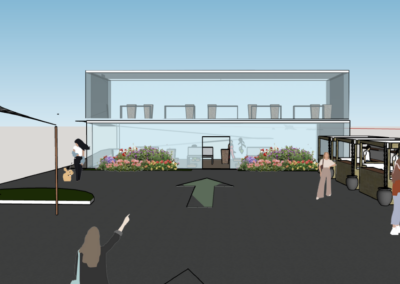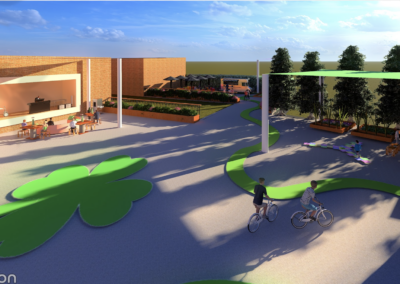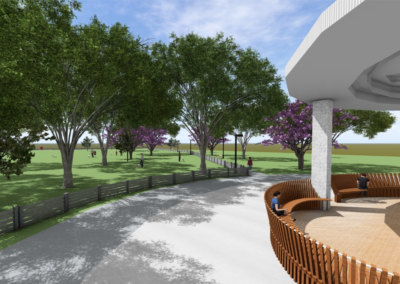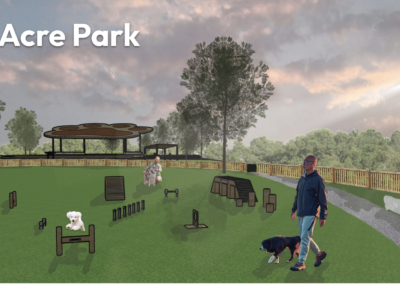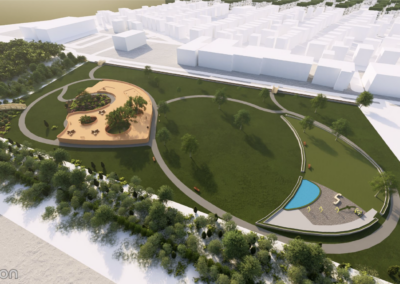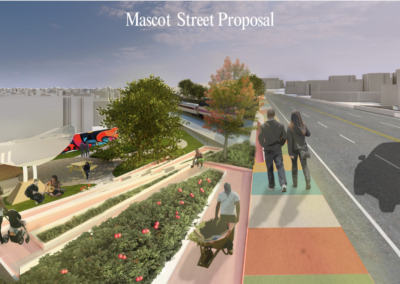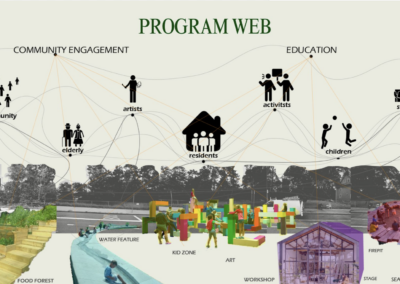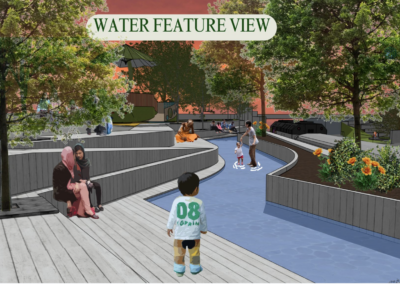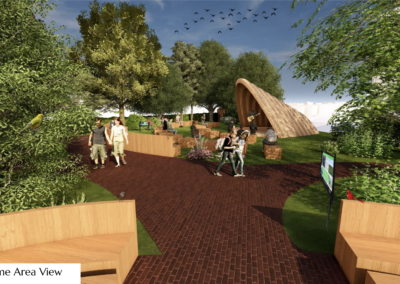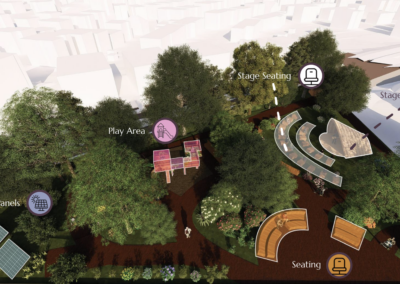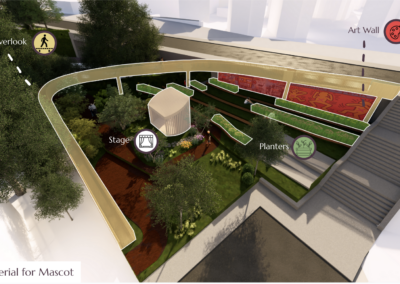August 29, 2024
SEED students design for local nonprofits and organizations
Estefany Benitez
The Hideo Sasaki Foundation just concluded our seventh annual Summer Exploratory Experience in Design (SEED) internship. This year, 45 high school interns from Boston, Chelsea, Cambridge, Everett, Malden, Melrose, Somerville, Revere, and Watertown had the opportunity to provide local nonprofits, community groups, and organizations with conceptual design solutions by applying the skills they learned through the internship to each site.
Our interns worked with a total of six clients in comparison to two last year. SEED 1, the introductory tier to design, worked with the City of Everett and the Jamaica Plain Neighborhood Development Corporation (JPNDC) while SEED 2, our returning alumni, worked with the Boston Food Forest Coalition. This year we also created a new level of the internship called SEED 3 for past SEED and DESI alumni entering university in the fall. SEED 3 interns worked with Design Grants alumni. The program also expanded in our number of partnerships, which increased significantly, and for the first time we welcomed project advisors from firms outside Sasaki.
JPNDC’s site was outdoor space at The Brewery, a small business complex in the previously abandoned Haffenreffer Brewery. JPNDC purchased the site to revitalize the neighborhood and support the development of successful small businesses. In 2006, after 26 years of redevelopment in multiple phases, The Brewery was completely renovated and occupied. Due to the urgency of getting the building open, most of JPNDC’s resources were invested in renovating and restoring the interior space, leaving the outdoor space as large parking lots. The amount of asphalt at the site has exacerbated the heat during the summer, and the lack of amenities has made the outdoor space unusable to the tenants and patrons that visit the site.
SEED 1 teams Ren, Delilah, and Clover took on the challenge of designing the JPNDC’s outdoor space to make it inviting to the surrounding community and to support the activities of the small businesses houses within The Brewery.
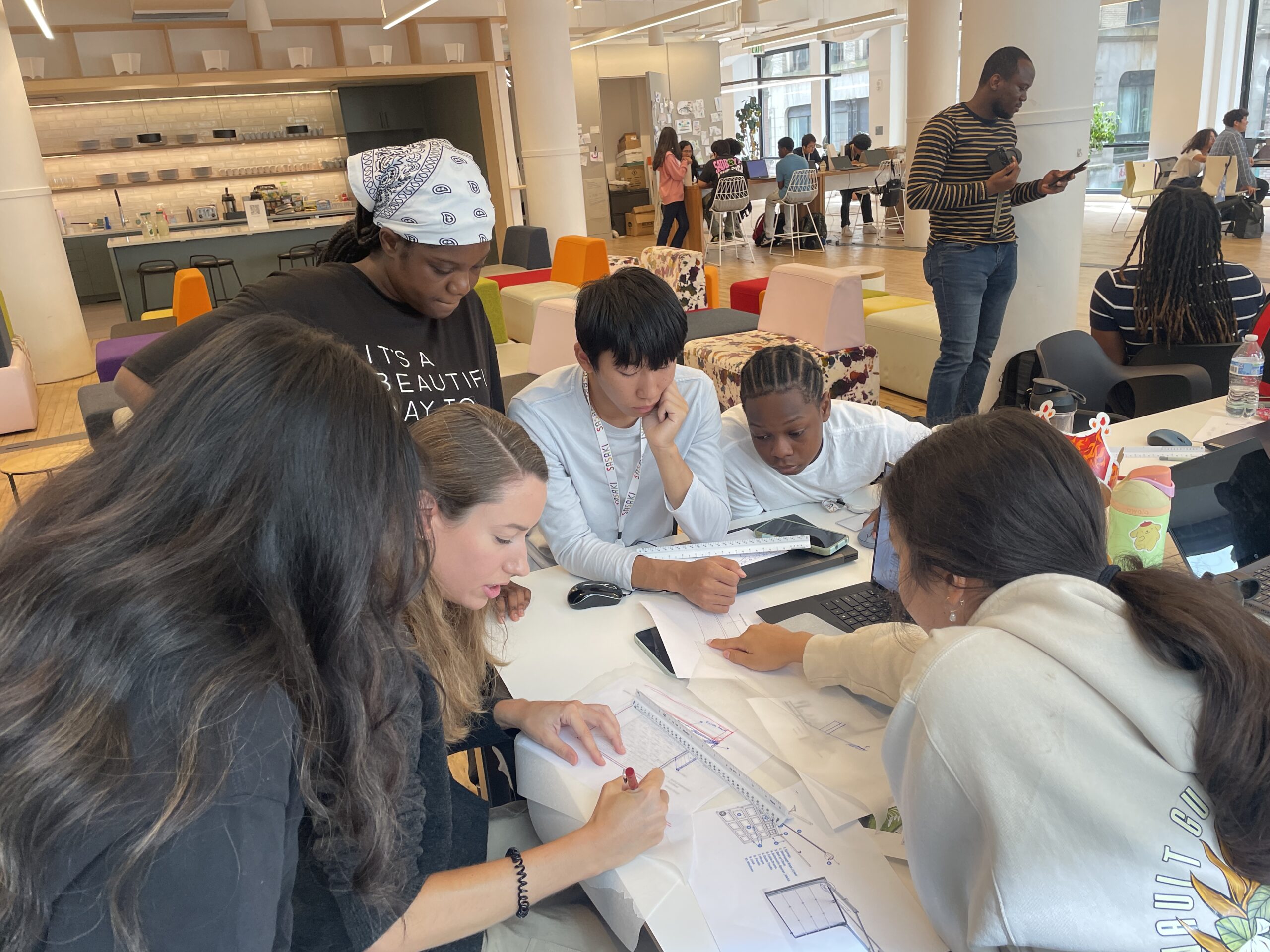
SEED 1 teams working at 110 Chauncy
Team Ren’s JP Corner design for JPNDC
Anna, Antonio, Ermias, Kaiden, Skyler, and Vitoria, with teaching assistant Jharitza
Team Delilah’s Creative Commons design for JPNDC
Byron, Heitor, Kelly, Lailah, and Sebastian, with teaching assistant Jeronimo
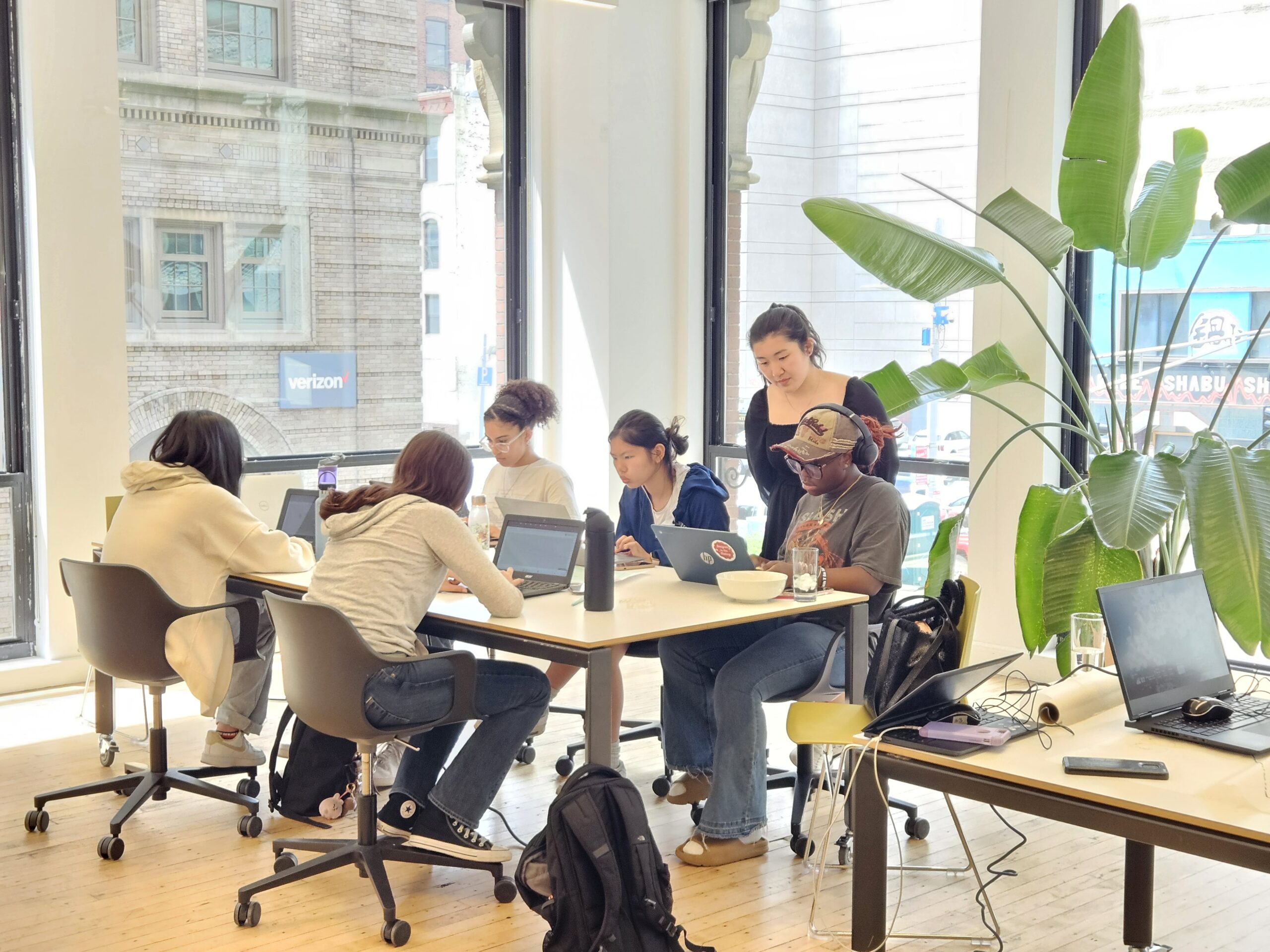
SEED 1 team Marigold working at 110 Chauncy
The City of Everett’s project site was Seven Acre Park, located within Everett’s Rivergreen Park. The brownfield site used to house a large GE factory that made WWII jet airplane engines in the 1940s. As recently as 2017 the riverfront was fenced off and inaccessible to residents due to the contamination left behind by the industrial use of the site. The river sediments and soil contain contaminants from manufacturing of coal tar, rubber, steel, and numerous industrial chemicals. In 2018, the City of Everett was able to cap the area with four feet of soil and created nearly a mile of waterfront paths while successfully restoring the wetland. Currently, Seven Acre Park is used as an unofficial dog park. Due to recent changes in climate it has experienced severe flooding during storms, making the park inaccessible to the community.
SEED 1 teams Lavender, Marigold, and Venus Fly Trap were tasked with creating design concepts that would make Seven Acre Park welcoming and engaging to the community, dog-friendly, and climate resilient.
Team Lavender’s design for Seven Acre Park
Daniel, Elfe, Hector (not pictured), Musie, and Thao, with teaching assistant Shante
Team Marigold’s design for Seven Acre Park
Amelia, Denay, Emma, Felix, Jasmine, and Nhi, with teaching assistant Sabrina
The SEED 2 project sites were 301 Norfolk Street and 84 Mascot Street. The parcels are currently owned by the BPDA, but the Boston Food Forest Coalition (BFFC) in partnership with Redefining Our Community (ROC) and Woodrow Avenue Neighborhood Association (WANA) is in process of acquiring them. The partnership will create a food forest to provide fresh produce, opportunities to learn about growing food, and a gathering and event space.
Prior to the interns taking on the project, BFFC led a community design process for 301 Norfolk Street, which included co-creating a vision for the space and building a stewardship team for its ongoing care. The organization had already received funding to start breaking ground this year. Due to limited resources, BFFC was not able to provide the community with renderings and detailed images of what the space would look like as a food forest; they were only able to create a 2D layout.
Throughout the internship’s six weeks, SEED 2 teams took the layout the community had designed with BFFC and created a program and vision of what the 301 Norfolk site would look like as a food forest and community space. The teams also designed concepts for the 84 Mascot Street site to create continuity between the two spaces.
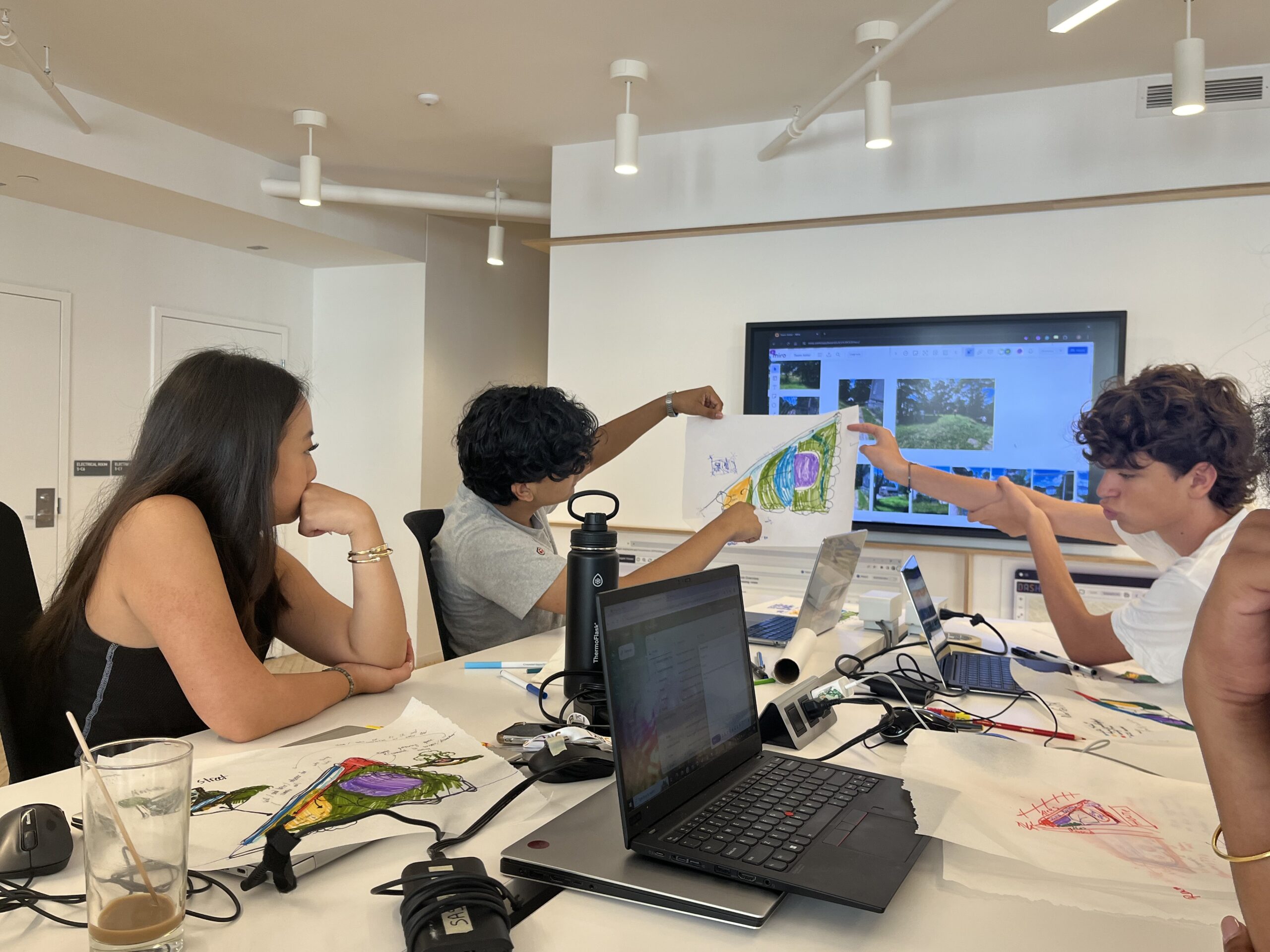
SEED 2 Team Aster at work at 110 Chauncy
Team Aster’s Mano Food Forest design (Mascot site)
Divine, Garabed, Katelyn, Matteo, and Yohan, with teaching assistant Jillian
Team Aster’s Mano Food Forest design
Divine, Garabed, Katelyn, Matteo, and Yohan, with teaching assistant Jillian
Team Aster’s Mano Food Forest design
Divine, Garabed, Katelyn, Matteo, and Yohan, with teaching assistant Jillian
Team Iris’s Emerald Commons design
CJ, Edwarda, Malena, Safiwah, and Sam, with teaching assistant Cyrus
Team Iris’s Emerald Commons design (Norfolk site)
CJ, Edwarda, Malena, Safiwah, and Sam, with teaching assistant Cyrus
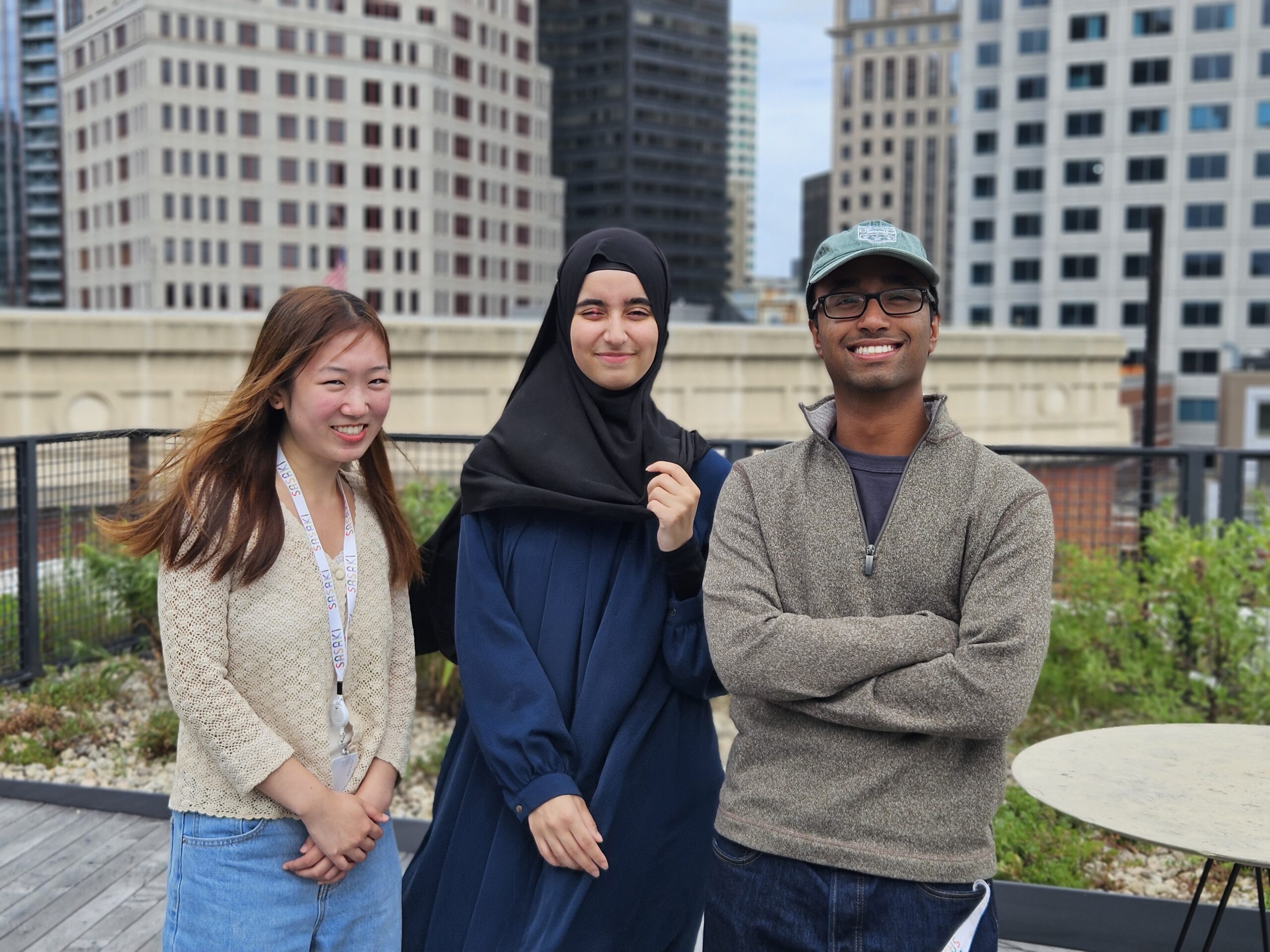
SEED 3 interns Sophia, Maryam, and Arham
SEED 3 is the new level of the internship program that aims to prepare SEED and DESI alumni who will enter university in the fall. The SEED 3 interns were hand-chosen based on their dedication and initiative in their past projects, their ability to collaborate, and their ability to work independently.
We paired each student with one of our Design Grants alumni to provide a more rigorous experience and prepare them for their first year of university. We also matched each SEED 3 intern with a leader from Sasaki to mentor them through the design process. Leading them through their experience was their teaching assistant, Sushil Darjee, who provided support as they learned how to draw, use the design software, and manage their project.
Sophia Wang and Design Studio for Social Intervention (DS4SI)
Melissa Teng, a 2022 Design Grant team member, is currently at DS4SI, an artistic research and development outfit for the improvement of civil society and everyday life. In partnership with communities, artists, and practitioners, DS4SI works to imagine, demonstrate, and collectively rebuild places to be more just and vibrant. DS4SI created the first Public Kitchen prototypes in 2011 and 2012 in Uphams Corner in Dorchester. Since then, Public Kitchens have popped up around the world.
Sophia’s mentor was Sasaki CEO James Miner. Through her project, she attended the public kitchen to engage with the community and assessed how their space could be more efficient. She also created a prototype toolkit to model implementation in other communities, and created renderings of what other kitchen modules could look like in DS4SI’s space.
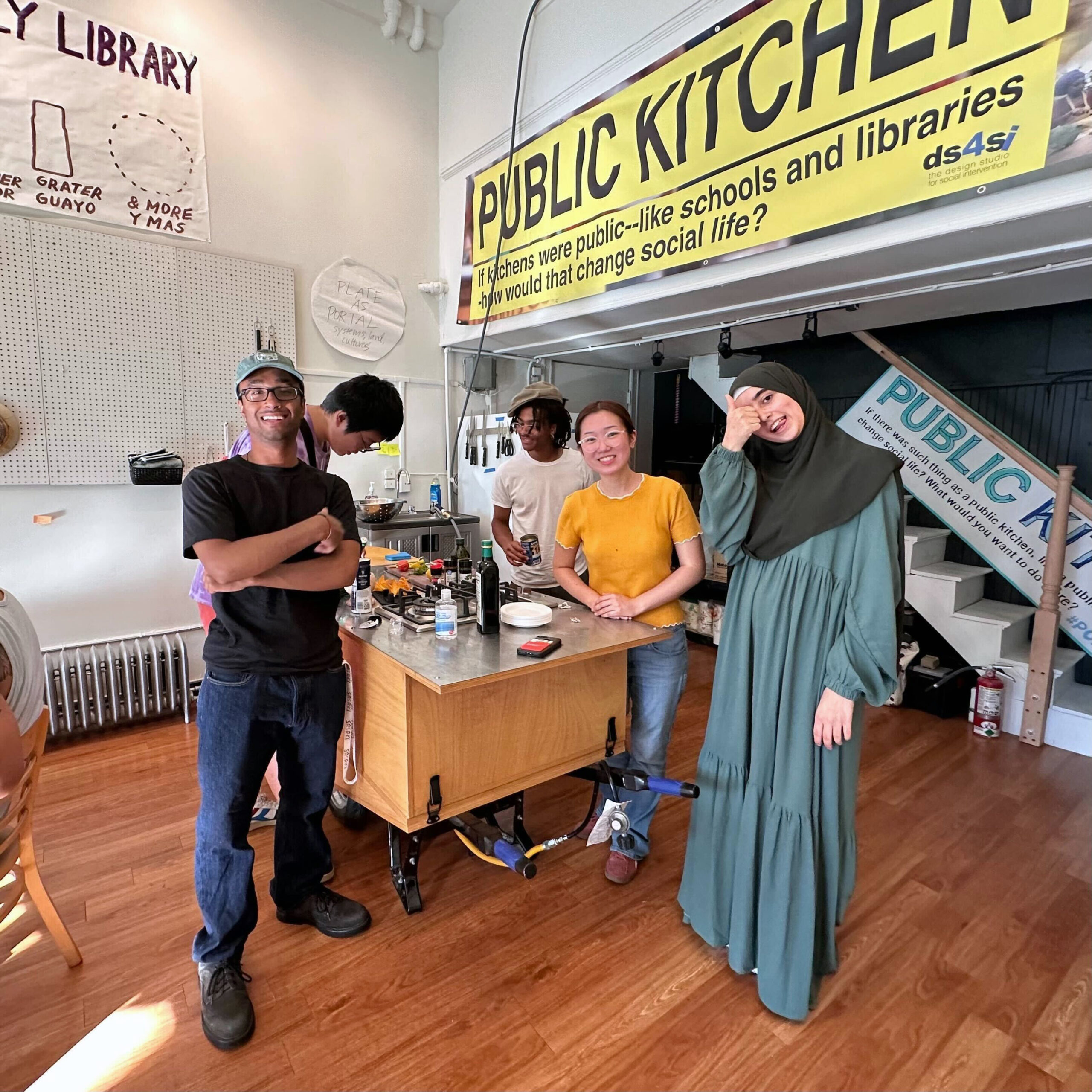
SEED 3 interns visiting DS4SI’s Public Kitchen
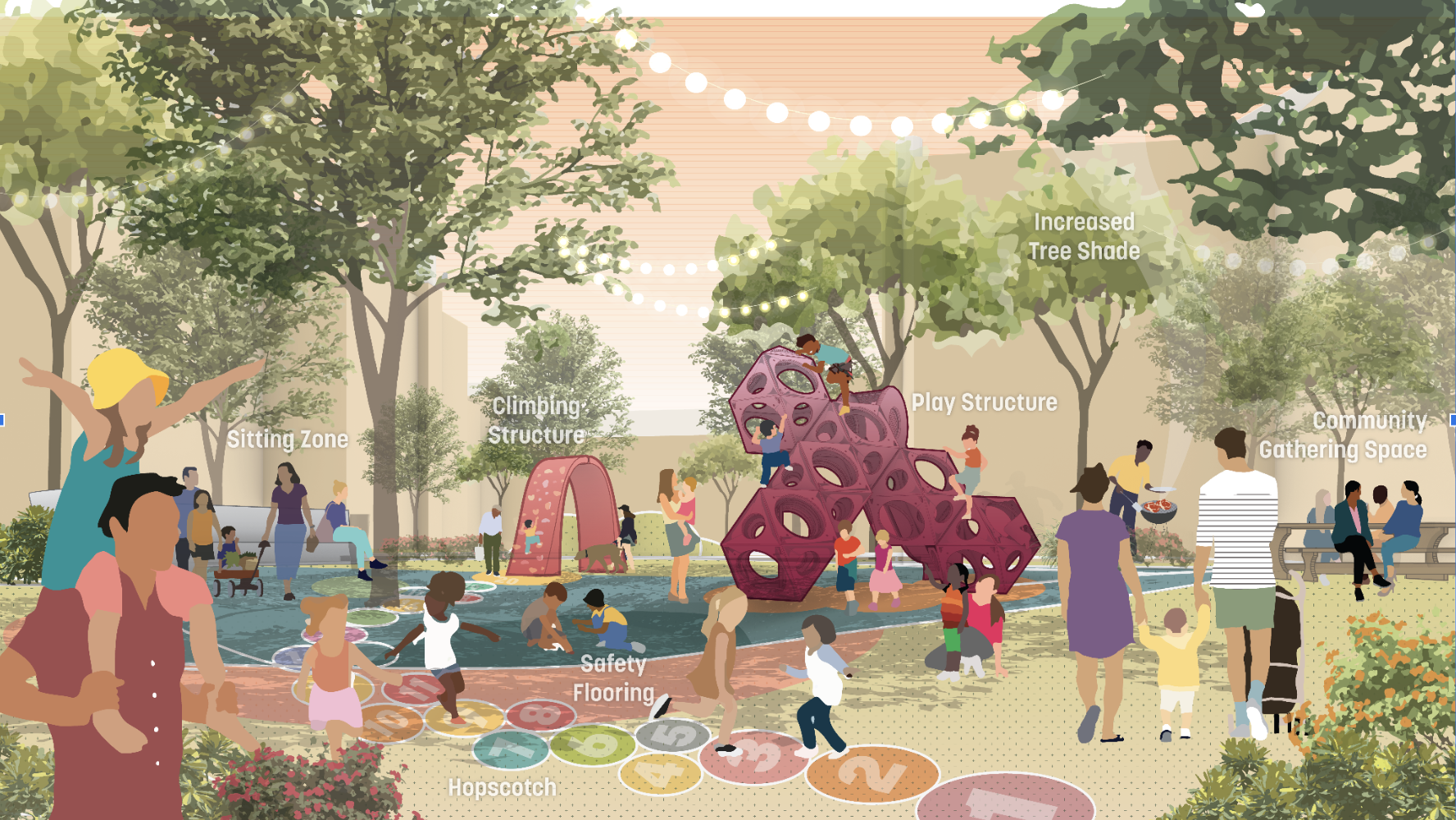
rendering of Arham’s EarlyEducatorSpace 2.0 design
Mohammed Arham and EarlyEducatorSpace 2.0
EarlyEducatorSpace 2.0 is a 2023 Design Grants project from the BHA in collaboration with the City of Boston, Northeastern University, and Sasaki. The team has led a community engagement and design process at a public housing development in South Boston that is home to multiple family child care providers and more than 200 children under 13. The BHA is interested in exploring climate resilient design solutions for the collection of outdoor courtyards, to make them sustainable and support intergenerational use. Through the initial community design process they were able to collect ideas for different elements and activities that residents would like to see in one courtyard at the site.
Arham was mentored by Sasaki associate principal Meredith McCarthy. His project created a comprehensive concept design for courtyards and open space at the West Broadway development that reflected resident and staff priorities for usability and maintenance. His work built on the existing community design process at West Broadway.
Maryam Karima and Movement Training and Cultural Center
Movement Training and Cultural Center is a 2023 Design Grants project from the Ayni Institute. The Ayni Institute is an organization rooted in the working class, immigrant, BIPOC communities and Indigenous wisdom. To support their work, the Ayni Institute committed to jointly buy a building with Neighbors United for a Better East Boston (NUBE). Ayni Institute is looking to design a space that embraces their organizational themes of reciprocity and justice, engagement between mother nature and hardships, and support for people in movements.
Through the Design Grants, Ayni Institute explored how their new building can be designed for their needs while taking into consideration the constraints of a three-story building with existing walls, floors, and accessibility issues. They are working to design a space that supports movement building and also allows Ayni Institute to support their organizational needs.
Maryam was mentored by Sasaki associate principal Rishi Nandi. Her project created a conference area for meetings, coworking space, room to commune over meals, and hidden storage. Maryam also created renderings of what it would look like to expand into the backyard area.
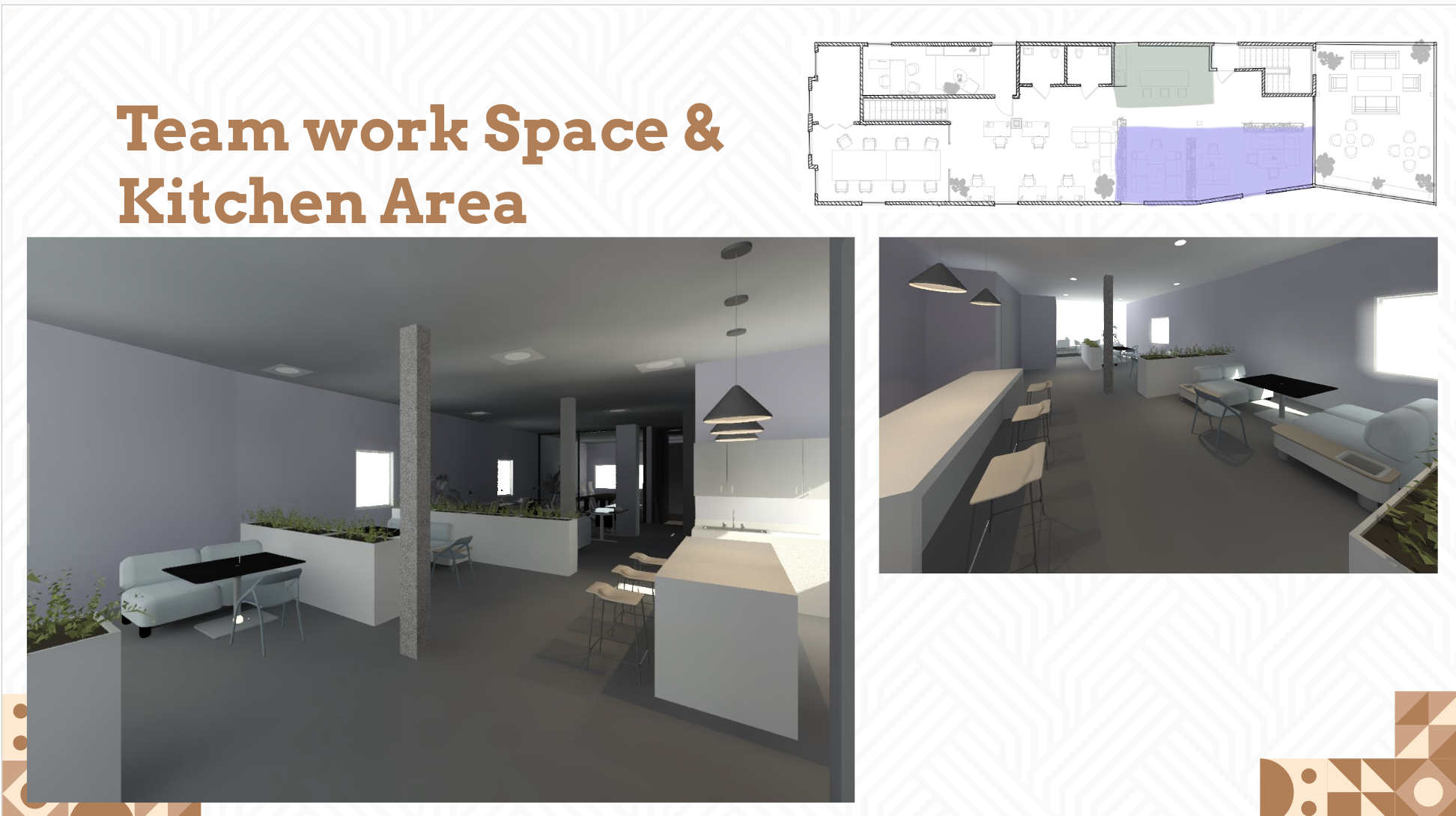
Maryam’s Movement Training and Cultural Center floor 2 plan and renderings
Professional Growth through SEED
As a part of the internship, senior teaching assistant Alexis Mazzatta created workshops that introduced students to the basics of SketchUp, Adobe Illustrator, and Photoshop, and built on the design software skills of SEED 2 interns by teaching them more advanced tools. This year Sasaki Foundation Program Associate Folajimi Bademosi also implemented the Commonwealth Corporation’s Signal Success, a personal and professional development curriculum, by creating LEAD (Leadership Education for Aspiring Designers). As our interns grow in professional experience our goal is to ensure they have the essential skills they need to succeed not only in the professional but also in the personal, interpersonal areas of their lives.
Get a closer look at this summer’s SEED experience on Instagram with our SEED 2024 highlights, and watch the final presentations on YouTube.
The Sasaki Foundation would like to thank this summer’s SEED staff: Estefany Benitez, Program Manager; Folajimi Bademosi, Program Associate; Isabella Buford, Youth Management Assistant; and Alexis Mazzatta, Senior Teaching Assistant.
The Sasaki Foundation would also like to thank all of this summer’s SEED teaching assistants: for SEED 1, Jharitza Cruz Lami, Shante Frank, Jeronimo Lopera, Ezekiel Lucas, Ruth Saenz, and Sabrina Xu; for SEED 2, Godwin Cyrus Gagaza and Jillian Ziegler; and for SEED 3, Sushil Darjee.
The Sasaki Foundation gives a special thanks to all of our project advisors this year. The time and energy they gave to each of our teams was invaluable and impactful. Our students walked away with so much knowledge and so many connections. SEED 1 project advisors were Surbhi Agrawal, Sasaki; Isaac Andrade, Sasaki; Diane Athaide, Sasaki; Anirudh Bodempudi, Sasaki; Nick Dyer, Sasaki; Max Frank, Isenberg; Eileen Gainfort, Sasaki; Inma Gil Cerezo, Sasaki; Jennifer Kaplan, Isenberg; Teresa Lai, Sasaki; Mytreyi Metta, Sasaki; Ivelisse Otero, Sasaki; Aeshna Prasad, Sasaki; Rinika Prince, Sasaki; Ann Tai, Sasaki; and Fangli Zhang, Sasaki. SEED 2 project advisors were Gidiony Alves, Sasaki; Jared Barnett, Sasaki; Gabe Colombo, Sasaki; Emely Fernandez, Sasaki; Andres Jimenez, Studio Enee; Emily Menard, Weston and Sampson; Juan Perez, Sasaki; Gift Prakkamakul, Sasaki; Lee Roberts, Sasaki; Kartiki Sharma, Sasaki; and Chris Winkler, Sasaki. SEED 3 mentors were Meredith McCarthy, Sasaki; James Miner, Sasaki; and Rishi Nandi, Sasaki.
We would also like to recognize the additional designers who participated this year. This program is a rich experience thanks to all of your efforts and contributions. Principals who took part in interviews were Ivelisse Otero, Sasaki; David Tabenken, Hacin; and Tao Zhang, Sasaki. Individuals who presented on projects and design topics were Katie Deyton, Hacin; Diana Gallo, Landworks Studio; Jaime Grasso, Solo Practitioner; Chris Hardy, Sasaki; Javaneh Jabbari, Leggat McCall; Karellis Rivera, Commodore Builders; Jenn Robertson, Sasaki; Mary Sullivan, Sasaki; Ricky Torres, Commodore Builders, and Samantha Webb, Commodore Builders.
Finally, thank you to all our funders, partners, and supporting organizations, who made this summer’s program possible.
Funders: MassHire Metro North Workforce Board via Commonwealth Corporation, City of Boston Office of Youth Employment & Opportunity, and Sasaki
Partners: Ayni Institute (Vanny Huot), BHA (Taylor Cain, Kimberly Lucas), Boston Food Forest Coalition (Liz Luc Clowes), City of Everett (Tom Philbin, Roberto Velasquez), DS4SI (Melissa Teng), JPNDC (Giovanny Valencia, Rebecca Mautner, Daniel Colombo, Ricky Torres), Redefining Our Community (Trena Matos-Ambroise), Sasaki, and Woodrow Avenue Neighborhood Association (Nina Johnson).
Supporting Organizations: Aurelia Institute, Boston Planning & Development Agency, DREAM Collaborative, Reclaim Roxbury, and Save the Harbor/Save the Bay

